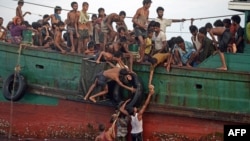There is strong linkage between poverty, security and crime. Today, there are more displaced people in the world than at any other time since World War II. Whether it be the Rohingya fleeing persecution in Burma, Syrians leaving their war-torn country, Africans seeking a better life, or children escaping gang violence in Central America, people are risking their lives to find refuge.
Their inherent vulnerability is shamelessly exploited by migrant smugglers, who collect from them exorbitant fees on promises of safe passage, then abuse and rob them, and too often, when the going gets rough, abandon them to their fate.
“The United States adheres to the principle that governments have a responsibility to ensure the security of their borders, as well as to promote effective and humane international migration policies that protect the human rights of migrants, especially women, children, and other vulnerable members of society,” said Principal Deputy Assistant Secretary of State Luis Arreaga.
Speaking at the 24th UN Commission on Crime Prevention and Criminal Justice, Mr. Arreaga said that we must address the reasons why these people felt the need to undertake such a journey in the first place.
Our campaign against transnational organized crime and corruption worldwide rests on the four pillars. First we must help build effective, fair, humane, and accountable criminal justice institutions.
Second, we must develop a culture of lawfulness that protects women, children, and vulnerable members of society.
Third, we must maximize the use of the UN Convention against Transnational Organized Crime, the UN Convention against Corruption, the three UN drug conventions, and the many counterterrorism conventions as the foundation for law enforcement and international cooperation to address these crimes.
And fourth, we must ensure the inclusion of civil society in crime prevention and criminal justice efforts.
“Our objective is to promote prosperity, enhance security, and strengthen governance to address the underlying social, economic, political, and security causes that drive migration,” said Mr. Arreaga. “We may have different views on language from time to time, but we can all agree on certain core objectives: security, prosperity, justice, human rights, and dignity for all people.”






